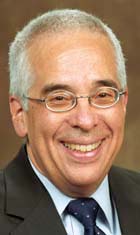Administration
Ed Macias to step down after 25 years as chief academic officer

After 25 years of serving as Washington University’s chief academic officer under a number of titles, Provost Ed Macias announced that he will be stepping down June 30, 2013.
Macias, 68, who joined the University in 1970 as an assistant professor in the Department of Chemistry, said he plans to stay heavily involved in continuing the University’s growth.
“Sandy Koufax was a left-handed pitcher for the Dodgers—he’s now in the Hall of Fame—and he left when he was in the top of his abilities, and I’ve always admired that,” Macias said. “I felt it was the right time for me personally, and…I felt strongly that the University is in very good shape—we have an excellent leadership team that I think will continue our improvement.”
As provost, Macias oversaw all of the University’s schools and worked directly with Chancellor Wrighton to form a vision for Washington University’s continued growth.
“I think most undergraduates don’t really see what a provost means to the University, but the provost is the one really responsible to see what direction we take from an academic perspective,” Assistant Vice Chancellor Rob Wild said. “Ed was very involved in continuing the strong progress we had in biology, for example, and really building other departments in Arts & Sciences to a point of national prominence.”
“Ed is just really good at bringing people together around ideas. He’s not a very vocal, extroverted leader, but he’s very thoughtful,” Wild added.
Beyond his professional talents, Wild noted that Macias is an avid sports fan and member of the local community, frequenting Wash. U. games and still taking the Metrolink to work.
“About ten years ago, Ed had the opportunity to throw out the first pitch at a Cardinals game where the University had purchased a large block of tickets,” Wild said. “He’s really part of the family here, and…I have a feeling, even though he is retiring, we’re still going to see him around at basketball games and various talks.”
Many University officials and professors who have been at the school for a large stretch of Macias’ tenure said the provost will leave a lasting impact.
Ed Macias University Provost Edward Macias, sitting next to Chancellor Mark Wrighton, speaks at the tuition forum on December 4, 2007. In April 2008, Macias left his position as Dean of the College of Arts & Sciences to become University Provost; a search committee is currently working to find a permenant replacement for the Arts & Sciences deanship.
“I’ve known him pretty much his entire career. And he’s been a good friend during that time, and an essential part of the team that brought the University to the international stature that it’s achieved in the last 15 years or so,” Wayne Fields, Lynne Cooper Harvey Distinguished Professor in English, said.
“When I was in charge of American Culture Studies and we were building that program…he was always both supportive and skeptical, it seemed to me, in ways that really forced me to be most responsible as I made plans there, and also to enjoy and be influenced by the give-and-take of what a program like that could mean for Arts & Sciences more generally,” Fields added.
“I have a great appreciation for his values of creating a seamless living learning environment, and [what]…impacts a student’s life all the way around,” Jill Carnaghi, dean of campus life, said. “He never has lost sight of the multifaceted lives of undergraduate students.”
William Buhro, chair of the Department of Chemistry, said that along with the late James McLeod, Macias worked to truly sculpt the current undergraduate experience at the University.
“Washington University was still kind of making the transition from a regional school to a national school, and then of course in the years since then, it has become one of the most recognized, best renowned institutions for undergraduate instruction,” Buhro said. “The two of them were really a team that raised the profile of Washington University substantially, in terms of quality and recognition of its undergraduate teaching program. I would say that’s probably his lasting legacy.”
The University has already formed a committee to find Macias’ replacement, composed of representatives from many of Washington University’s divisions, including the School of Social Work, the Law School and the College of Arts & Sciences.
“I think [we are looking for someone with] broad interest in the entire university, and the sense that we are all, no matter where we are, whether it’s engineering or law or wherever, a part of the same university, working toward common goals and ambitions,” Fields said. “And I think that, as we move ahead, that’s the most important thing for Washington University to be able to continue to expand and develop, is that sense that we are a community in which all these pieces are part of something larger and complete.
With additional reporting by Sadie Smeck

